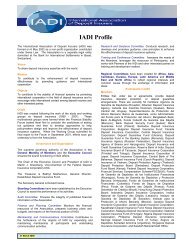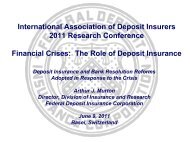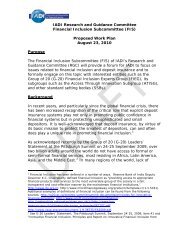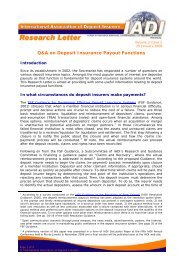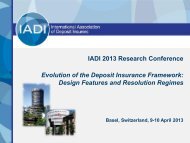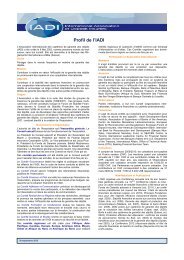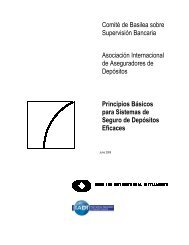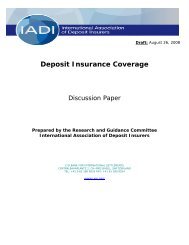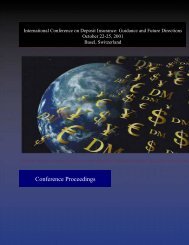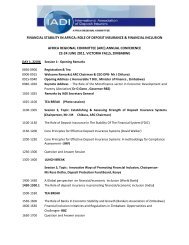Volume II - PDF - International Association of Deposit Insurers
Volume II - PDF - International Association of Deposit Insurers
Volume II - PDF - International Association of Deposit Insurers
- No tags were found...
You also want an ePaper? Increase the reach of your titles
YUMPU automatically turns print PDFs into web optimized ePapers that Google loves.
•BACKGROUND DOCUMENTS•<br />
Part I: Research<br />
For deposit insurance systems that are predominately<br />
administered privately through a board<br />
arrangement, the board composition may include<br />
active member institutions. <strong>Deposit</strong> insurance<br />
systems that are jointly administered may include<br />
members affiliated with financial institutions as well<br />
as government <strong>of</strong>ficials on their board. However,<br />
care needs to be taken to ensure that such arrangements<br />
do not lead to conflicts <strong>of</strong> interest that<br />
can be detrimental to the deposit insurance system.<br />
A number <strong>of</strong> public systems reserve positions for<br />
independent private members—those not currently<br />
active in the affairs <strong>of</strong> member institutions—in<br />
order to obtain additional expertise and advice.<br />
Some public schemes allow for members who<br />
are actively affiliated with member institutions.<br />
However, most systems discourage this practice<br />
because the interests <strong>of</strong> such members may conflict<br />
with the interests <strong>of</strong> other stakeholders and the confidentiality<br />
<strong>of</strong> information could be compromised.<br />
Governance systems <strong>of</strong>ten can be enhanced through<br />
the use <strong>of</strong> special advisory bodies or committees.<br />
Such committees can include industry representatives,<br />
particularly in systems that may exclude their<br />
direct participation in the governing body. These<br />
committees also may include industry representatives<br />
who can provide their expertise and views on<br />
certain matters, such as real estate. Once again,<br />
however, the use <strong>of</strong> outside experts should not<br />
compromise the confidentiality <strong>of</strong> information or<br />
permit conflicts <strong>of</strong> interest to arise.<br />
The delineation <strong>of</strong> the duties and responsibilities<br />
<strong>of</strong> the governing body is a critical aspect <strong>of</strong><br />
good corporate governance. It is important for<br />
members <strong>of</strong> the governing body—such as members<br />
<strong>of</strong> the board, management and employees—to<br />
understand and to meet their responsibilities. It<br />
also is important to evaluate regularly the board’s<br />
effectiveness in fulfilling its responsibilities.<br />
In many countries, the governing body is given<br />
authority for the selection and oversight <strong>of</strong> senior<br />
management, and the responsibility to review<br />
management, operations and the performance <strong>of</strong> the<br />
organisation. This can be extended to require that<br />
the governing body ensure that effective strategicand<br />
risk-management processes are in place. 7<br />
The governing body’s authority also may include<br />
the ability to remove any <strong>of</strong>ficer or employee <strong>of</strong> the<br />
organisation for cause, and to deal with confidentiality,<br />
ethical business conduct, and conflict-<strong>of</strong>interest<br />
issues. Other approaches may provide the<br />
board with the authority, under statute, to prepare<br />
and issue rules and regulations necessary for the<br />
sound functioning <strong>of</strong> the organisation. Some systems<br />
with a focus on risk minimisation may provide extra<br />
authority, through statute, to make regulations<br />
affecting the affairs <strong>of</strong> member institutions.<br />
Internal-control processes<br />
Internal-control processes—by which deficiencies<br />
are identified and corrected—are important governance<br />
considerations. Sound internal-control and<br />
audit processes play a crucial role in ensuring the<br />
integrity and efficiency <strong>of</strong> operations, and they<br />
can enhance corporate standards <strong>of</strong> accountability.<br />
Internal audit programs typically involve regular<br />
compliance and accountability reviews and the<br />
monitoring <strong>of</strong> performance according to set standards<br />
and policies. 8 Some systems go so far as to<br />
include public-service delivery and operational<br />
quality reviews. It can be particularly helpful if the<br />
internal-control processes <strong>of</strong> the deposit insurer<br />
correspond to the general requirements for audit<br />
purposes set for financial institutions or comparable<br />
government institutions.<br />
Accountability, transparency<br />
and disclosure<br />
Appropriate accountability, transparency and disclosure<br />
regimes for the deposit insurer and other<br />
safety-net participants are important structure and<br />
organisation issues. It is important that the deposit<br />
insurer, regardless <strong>of</strong> its structure, be held accountable<br />
for its decisions and actions. In circumstances<br />
where deposit insurance is provided through a<br />
legally separate entity, accountability can be bolstered<br />
by ensuring that the board <strong>of</strong> directors and<br />
senior management are responsible and accountable<br />
to their primary stakeholder. In many public systems<br />
80<br />
Guidance for Developing Effective <strong>Deposit</strong> Insurance Systems: <strong>Volume</strong> <strong>II</strong>



